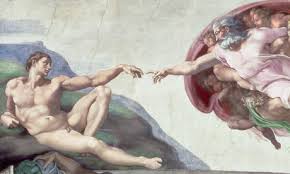Richard Rohr: Order, Disorder, Reorder
The Bible reveals the development of human consciousness and human readiness for a Divine Love Affair. The differences between earlier and later Scriptures clearly show an evolution of human capacity, comprehension, and depth of experience. Jesus, for me, represents the mature image of what God is doing in history. In Israel’s growth as a people we see the pattern of what happens to every individual and to every community that sets out on the journey of faith. Israel is the “womb of the Incarnation,” for it is in their history that the whole drama is set in motion. Jesus fully grows up inside that womb. And we must grow up too. Little by little, human consciousness is prepared to see how God loves and liberates us. But we will face plenty of resistance, revealed in the constant hostility to Jesus even and most especially from religious people, ending in the very “killing of God.”
There are many models of human and spiritual development. We could describe three stages as Simple Consciousness, Complex Consciousness (both “fight and flight”), and Non-Dual Consciousness (“the unitive way” or “third way”). More recently, I have been calling the developmental stages Order > Disorder > Reorder. In short, I see this pattern in the Bible and in human lives:
1. Order: We begin with almost entirely tribal thinking, mirroring the individual journey, which starts with an egocentric need for “order” and “self.” Only gradually do we move toward inclusive love.
2. Disorder: We slowly recognize the invitation to a “face to face” love affair through the biblical dialogue of election, failure, sin, and grace, which matures the soul. This is where we need wisdom teachers to guide us through our “disorder.”
3. Reorder: Among a symbolic few, there is a breakthrough to unitive consciousness (for example, figures like Abraham and Sarah, Moses, David, the Psalmists, many of the prophets, Job, Mary, Mary Magdalene, Jesus, and Paul). This is also what some call enlightenment or salvation.
Conservatives normally get trapped in the first stage, progressives are trapped in the second, and only a minority of either group seem to get to the third. The last stage is considered dangerous to people in the first stage, and rather unknown and invisible to people in the second stage. If you are not trained in a trust of both love and mystery, and also some ability to hold anxiety and paradox, all of which allow the divine entry into the soul, you will not proceed very far on the spiritual journey. In fact, you will often run back to stage one when the going gets rough in stage two. The great weakness of much Western spirituality is that there is little understanding of the necessity of darkness and “not knowing” (which is the transformative alchemy of faith). This is what keeps so much religion at stage one.
Thus the biblical tradition, and Jesus in particular, praises faith even more often than love. Why? Because faith is that patience with mystery that allows you to negotiate the stages of life and move toward non-egocentric love. As both John of the Cross and Gerald May point out in their own descriptions of “the dark night of the soul,” God teaches the soul most profoundly through darkness–and not just light! We only need enough light to be able to trust the darkness. Trials and darkness teach us how to trust in a very practical way that a good God is guiding us. I don’t need to be perfectly certain before I take the next step. Now I can trust that even my mistakes will be used in my favor, if I allow them to be. This is a wonderful way to grow in human love too, by the way. Darkness, mistakes, and trials are the supreme teachers. Success really teaches you nothing; it just feels good.
Love is the source and goal, faith is the slow process of getting there, and hope is the willingness to move forward without resolution and closure. And these are indeed, “the three things that last” (1 Corinthians 13:13). People who have these gifts–faith, hope, and love–are indestructible.




